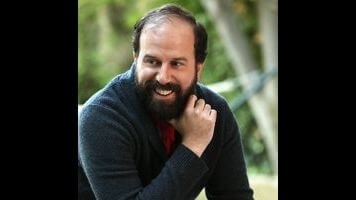Married asks if getting your act together means shedding those who haven’t

A continuing theme of Married’s second season has been growing up. That might seem like a late game realization for two people in their 40s, but Russ and Lina were introduced as two people who’d put off growing up for as long as humanly possible. Even the inescapable daily reminders of their adulthood—bills, landlords, jobs, three children—were treated with wisecracking detachment, a two-handed comedy routine wryly mocking the idea that they were supposed to act like responsible adults all the time.
But by the time we met Russ and Lina, the jokes had started getting tired and desperate, the pressures of now and the regrets of the past combining to take the “team” out of their “comedy team,” and leaving them looking across the bed at someone who’d come to represent every missed opportunity and fading dream. This season, Married has done something paradoxically risky—it’s made the Bowmans stable. Russ has a good job that actually taps into his long-dormant creative aspirations (even being asked back to his old college as an exemplar of the working artist). Lina, the business major with the wild side, might not have found a dream vocation, but it’s not clear that she has one. At any rate, her work as a teacher’s aide has restored some of the self-confidence and independence whose lack forced her into clear depression in the first season. (Judy Greer’s delivery of Lina’s season one line to Russ, “I don’t hate you. I just hate my life. And my life is you,” is the sort of gut-punch that keeps Married an intensely unsettling comedy.) So, with Russ and Lina getting their shit together, the question is how long will they have room for people whose lives are taking them the other way?
For Jenny Slate’s Jess, the end came a few weeks ago, her destabilizing energy in the group a threat that Russ and Lina finally could no longer tolerate. That sounds harsh, but that’s the heart of this season of Married—as the Bowmans become comfortable, the people who make them uncomfortable are eased out. Which brings us to A.J.
Brett Gelman’s version of the “group screwup” is a singular creation, partaking of Gelman’s signature, even dangerous intensity. A.J.—divorced, recovering from a wasps’ nest of addictions—is always on the edge of being simply too much damned trouble to put up with. What saves him (and what doomed Jess) is not so much that he’s sobered up, as it is his ability to recognize his own boundary-free brand of craziness and pull it back, often just in time. That’s what saved his relationship with Sarah Burns’ Abby—unlike the old A.J., he saw that his neediness (and creepy, borderline stalking) was making her look for an exit, so he edged toward the door himself. Tonight, Abby’s still with him, although she confides in Lina that “A.J. and I are just hanging out,” an arrangement A.J. seems content with for the moment, especially since he’s found a new passion to follow.
Hitting on the idea of a children’s book about addiction (now entitled “Farmer Todd Has A Problem: Helping Children Understand The Disease Of Addiction”), A.J. is throwing himself headlong into what he imagines will be his new direction in life. Which it may well be (it’s not a bad idea), except that A.J. is incapable of reining in his enthusiasm, emotionally blackmailing Russ into being the book’s illustrator (at the A.A. meeting he’s also emotionally blackmailed Russ into attending). In his recent A.V. Club interview, Married creator Andrew Gurland said of A.J.’s arc this season, “Last year, A.J. was in a downward spiral: drugs, alcohol, sex addiction. And a lot of my friends who have experienced that, it’s not like suddenly when they got sober they stopped being crazy.” Coming up with Farmer Todd while telling a bedtime story to Abby’s son Chase, A.J. spoke of Farmer Todd’s “God-sized hole,” as good a description as any of the bottomless need that the show posits as the cause of A.J.’s obsessive behavior. A.J.’s sober, but the hole remains (“In three weeks he will be obsessed with something else,” counsels Lina), pushing him to badger Russ about the book so incessantly that it causes the two friends to nearly come to blows.
The fight, when it comes, ties back in with Russ’ concept of being a grown up, with him putting off A.J.’s relentless manipulations with the same argument he’s said—to Lina, to his kids—all season. “I need to make money. I need to spend time with my family,” Russ snaps, after A.J.—being A.J.—has responded to Russ’ unwillingness by serving Russ with legal papers announcing the official “dissolution of [their] friendship.” What Russ is really saying is that he’s outgrown A.J.’s bullshit, a choice that risks not only the friendship, but our sympathy. A.J.’s a trying friend to have, and Russ, as he did with Jess, certainly has the right to decide enough’s enough. But A.J.’s also been there when Russ needed him (both he and Bernie have bailed the Bowmans out financially over the years), and he is, in his way a good friend. So was Jess. (And he’s not wrong about Russ not being as satisfied in his job as he lets on.) But this season of Married has explored the fact that sometimes friendship doesn’t survive the changes involved in growing up. In the opening scene, Russ and Lina counsel eldest daughter Ella:


































![Rob Reiner's son booked for murder amid homicide investigation [Updated]](https://img.pastemagazine.com/wp-content/avuploads/2025/12/15131025/MixCollage-15-Dec-2025-01-10-PM-9121.jpg)




